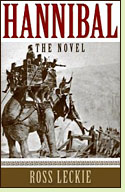Hannibal
by Ross Leckie
Reviewed by David Maclaine

If Ross Leckie's Hannibal is only the second-best novel about the Carthaginian general, the author's artistry is reason enough to seek it out, even if you've already read Durham's richer and more thorough Pride of Carthage. The story begins in Hannibal's childhood, and a third of the book passes before he embarks on his long war against Rome. This means that the treatment of the famous campaigns is selective and spare, but it is nice to have another version besides Flaubert's of the mercenary revolt, and to have any version at all of the way Carthage expanded in Spain. My only quibble with the treatment of Hannibal's youth is two obvious borrowings from Mary Renault's Fire from Heaven. I'm not sure why Leckie has Hannibal reenact the famous story about how Alexander tamed his war-horse Bucephalis, complete with Renault's embellishments about the horse's mistreatment, or why his hero goes out to kill his first man in battle on a mission so very like that in Renault's book.
Leckie's version of Hannibal's story is long on atrocity, packing in more varied forms of torture and execution than you'd expect to find in any three novels. The focus is on the leader himself - the novel takes the form of his memoir - showing how his father shaped his fate toward total, unconditional war against Rome and inured him to horror in childhood, ensuring that he left a trail of blood and eventually lost any positive sense of himself. It is the harshest, least romantic version of this war one can imagine, with the strokes of military genius invariably set off by an uncompromising view of their cost. But Leckie will have more to say about Hannibal's legacy, completing the tragic portrait in two further books of a trilogy. (1996, 245 pages)
More about Hannibal at Powell's Books, Amazon.comHannibal appears on the list of The 50 Best Historical Novels for a Survey of Ancient Roman History
The completion of the trilogy:
#2: Scipio Africanus (1998). See review or more info at Powell's Books
#3: Carthage (2001). See review or more info at Powell's Books
Other novels about Hannibal and the Second Punic War:
Salammbo by Gustave Flaubert (1862), about a mercenary soldier who falls in love with the daughter of Hamilcar Barca. See review or more info at Powell's Books
Pride of Carthage by David Anthony Durham (2005), about Hannibal and Carthage during the Second Punic War. See review or more info at Powell's Books
The Coin of Carthage by Bryher (1963), about ordinary people struggling to survive amid the Second Punic War. See review or more info at Amazon.com
Nonfiction about Hannibal:
Hannibal: The Military Biography of Rome's Greatest Enemy by Richard A. Gabriel (2011). More info
Hannibal: Enemy of Rome by Leonard Cottrell (1967). More info
Hannibal by Theodore Ayrault Dodge (1891). More info
Online:
The truth about Hannibal's route across the Alps at The Guardian
Back to Novels of Ancient History
Back to Directory of Book Reviews